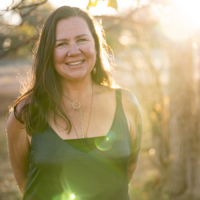A childhood friend recently resurfaced in my life via Facebook Messenger.
She shared that my likes and encouraging comments on her recent health journey were triggering. She kindly explained that she didn’t feel that I had offered her amends for the way that I treated her in the past and that it was still bothering her.
I offered an apology for my likes and such being triggering and let her know that I wouldn’t do that anymore. I also suggested that if my actions felt triggering, we need not to be “friends” on Facebook moving forward.
She was surprised by my response. I was equally surprised that I was expected to make amends as I felt there had been plenty of missteps to go around.
Her next request was that I call her. I let her know that wasn’t going to happen. We had spoken once in 15 years. Our friendship had persisted only in a social media space and I didn’t feel compelled to reunite. I let her know that I had done the work around our relationship from my own side and that perhaps the trigger might be showing her where she had work to do as well.
The exchange left a bad taste in my mouth and an ache in my heart and stomach.
Something useful that I have learned from Buddhism is that sometimes it’s best to take a “water under the bridge” approach to conflict—especially if we assess the circumstances around an issue and determine there is more at play than hurt feelings or that revisiting the issue could be traumatizing for one or both parties.
Making amends can be defined as “making things right” after doing something wrong. An apology is an expression of regret for doing something that hurt another person. Both require a feeling that there needs to be further resolution. I felt neither.
As I contemplated the exchange, I remembered the Yung Pueblo quote:
“True power is living the realization that you are your own healer, hero, and leader.”
The reason that I couldn’t recall what I had done that I would be making amends for was because it was the period after my mom died unexpectedly. I have little to no recollection of that time. I was in the depths of grief and low-level depression for many years and was barely able to get my son out the door to school, much less function fully as a friend to anyone, including myself.
With white knuckles I found a way to move from the sadness that Wisconsin holds for me to this day, to the mountains of Colorado where I feel happy and free. When I made that move, I left with a truckload of essentials and nothing else. I started over.
Fast-forward a decade to my first month-long meditation retreat. I spent weeks processing this challenging time in my life. Session after session, I worked with the wrongs I felt had been done to me and vice versa—including with this friend and her circle of friends. While the work during that retreat had my skin feeling like it was being peeled off my body, it was the most intense and healing time of my life. The only person I felt I needed to make amends with at the end was my dad and I did so.
I was “my own healer, hero, and leader.”
I understand that making amends is a powerful practice for some circumstances. I also know the power of apology. However, when we seek amends or apologies, we are coming from a place that someone has wronged us and we are deserving of such. We feel entitled and special. When we instead take radical responsibility for our own experience, we become our own healer. We can then decide from a place of personal strength whether or not we want to continue to have a relationship with the person and whether or not that is appropriate. It is okay to walk away and to not look back.
The request for amends opened a traumatic door that forced me to revisit a time and space I walked away from. As my “own healer, hero, and leader” the answer to revisiting this relationship was a strong no. For me, it was water under the bridge. It doesn’t always take two to tango.
Sorry. Not sorry.
~
Please consider Boosting our authors’ articles in their first week to help them win Elephant’s Ecosystem so they can get paid and write more.

 Share on bsky
Share on bsky





Read 17 comments and reply